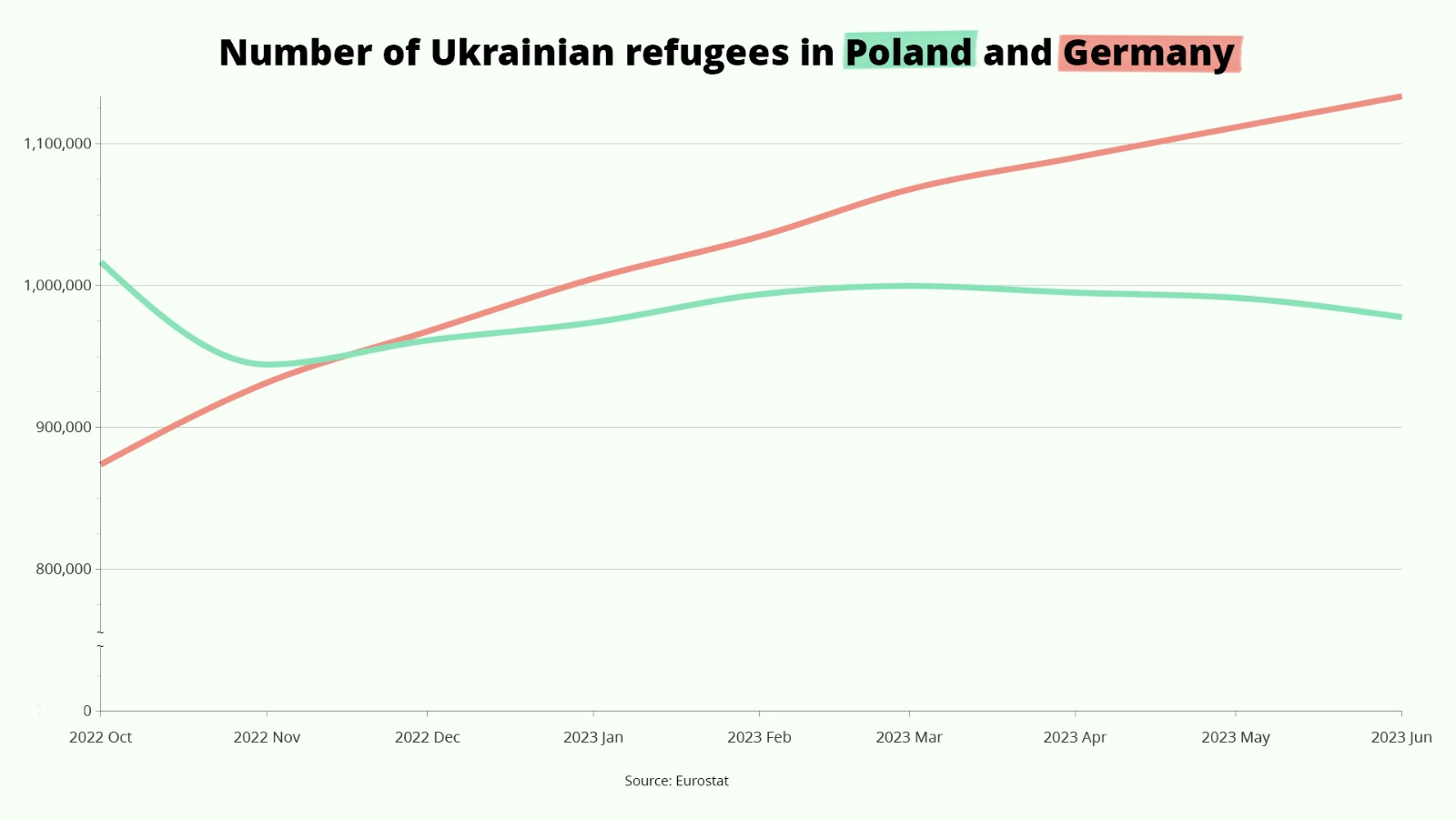Poland is “losing the race for Ukrainians” and “urgently needs migrants”, one of the country’s biggest business groups has warned, after EU data indicated that some Ukrainian refugees are moving west.
Eurostat figures published this month show that the number of Ukrainian refugees in Poland fell to 977,740 in June, down from 991,375 in May and from 1.02 million last October.
Meanwhile, the figure in Germany rose from 873,860 to 1.13 million between October and June, and in the EU as a whole from 3.76 million to 4.07 million.
In July, the number of refugees in Poland fell even further, to 971,080. However, the July data for most EU countries, including Germany, is not yet available.

In a statement released earlier this month, Poland’s Union of Entrepreneurs and Employers (ZPP) raised concern at the trends being shown in the figures.
“The Polish economy urgently needs migrants who want to work, study and live in our country,” wrote the ZPP, noting that, in the aftermath of Russia’s invasion, refugees from Ukraine filled “thousands of vacancies” in Poland.
“Today, however, refugees are increasingly choosing other destinations, tempted by offers from Germany and Canada, among others. Poland has begun to lose the battle to keep them on our market,” they added.
“It should also be remembered that with the end of the war, many people who are still living and working in Poland will return to their homes in Ukraine. This will mean serious difficulties for our labour market.”
https://t.co/kktRXHUZeE
Polski rynek pracy potrzebuje migrantów, którzy chcą pracować , uczyć się i mieszkać 🇵🇱 w naszym państwie. W walkę o Ukraińców 🇺🇦 włączyły się https://t.co/I1agI0u8f0. Niemcy 🇩🇪 – to z nimi w tym momencie nasz kraj przegrywa wyścig o migrantów z Ukrainy…— ZPP (@ZPPnetpl) August 16, 2023
Even before the arrival of Ukrainian refugees last year, Poland had been experiencing an unprecendent wave of immigration. For five years running it has issued the EU’s most first residence permits to immigrants from outside the bloc.
In 2022, the number of foreign workers registered in Poland passed one million for the first time, rising 22% over the course of the year. The majority of those workers are Ukrainian.
Yet, with unemployment at historically low levels and a shrinking, ageing society, Poland is still facing staff shortages in many industries.
According to the state Social Insurance Institution (ZUS), in order to maintain its current ratio of working-age population to retirees, Poland would need to attract almost two million immigrant workers over the next decade.
Poland needs two million new foreign workers over the next decade to counteract the ageing of its population, says the state social insurance agency.
It notes that recent years have seen mass immigration, with over a million foreign workers now registered https://t.co/LW5278uawm
— Notes from Poland 🇵🇱 (@notesfrompoland) July 12, 2023
“Without refugee labour in our country, companies representing various industries could have very serious problems not only developing but even maintaining their current scale of operations,” said Szymon Witkowski, director of the Labour Forum of the ZPP.
In its recent statement, the ZPP called on the government to improve employment procedures for refugee workers as well as clarify their legal status in the country.
“The legal solutions introduced seem too complicated,” said the organisation in the recommendation section of its report. “The legislator’s response to the needs of refugees is delayed, which creates uncertainty not only among citizens of Ukraine, but also among employers.”

Notes from Poland is run by a small editorial team and published by an independent, non-profit foundation that is funded through donations from our readers. We cannot do what we do without your support.
Main image credit: Olga Strachna/Flickr (under CC BY-NC 2.0)

Alicja Ptak is deputy editor-in-chief of Notes from Poland and a multimedia journalist. She has written for Clean Energy Wire and The Times, and she hosts her own podcast, The Warsaw Wire, on Poland’s economy and energy sector. She previously worked for Reuters.



















